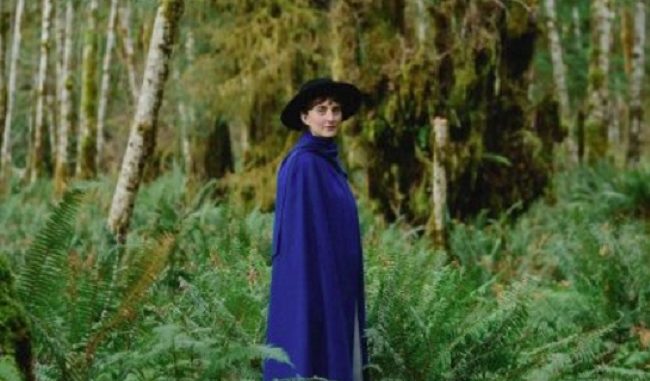
Here we are again with the first Folk Roundup of 2024, and with five albums to talk about that really do go to emphasize what a diverse range of music now falls under the folk label. Although we aren’t covering it here it’s good to see that our plea for more Welsh Folk didn’t fall on deaf ears, the latest release by Cerys Hafana is going to get some coverage elsewhere, suffice to say that ‘The Bitter EP‘ features some distinctive reworking of traditional songs viewing them through a distorting lens that by so doing reveals new aspects to the well known and familiar. And for anyone who still feels it a little odd that Americana UK should cover folk at all it’s worth repeating that there is often as blurred a line between Americana and Folk as there is between Americana and so many other musical genres. Take as an example our first one out of the bag, Niall McCabe who could be found earlier this year showcasing his take on folk inclined singer-songwriter at the AMAUK’s AmericanaFest. So much for boundaries.
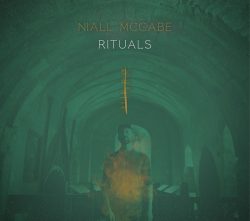 Niall McCabe has spent a decade playing with the folk-soul outfit The Niall McCabe Band as well as singing with Beoga. ‘Rituals‘ is his debut solo album, leaning into his finger-picked guitar playing and songs which focus down on, yes, topics like love and life and death but also on the fulfilments offered by life’s small repetitions as described on ‘Rituals.’ Niall McCabe grew up on a remote Irish island and it’s surely this that gives veracity to songs which dwell on forces of nature whether it be the power of the sea that has to be faced by crab fishers in the ‘November Swell‘ or the powerful winds that blow through a metaphorical emotional house in ‘Tornado.’ Niall McCabe has a warmly mellow vocal, which on songs like ‘Stonemason‘ occasionally carries an echo of Paul Brady. The songs are musically fleshed out – there may be just the accompaniment of Seán Óg Graham for McCabe, but since they are both multi-instrumentalist there’s an impressive dozen or so instruments played across ‘Rituals‘ giving it a certain polish. (6/10)
Niall McCabe has spent a decade playing with the folk-soul outfit The Niall McCabe Band as well as singing with Beoga. ‘Rituals‘ is his debut solo album, leaning into his finger-picked guitar playing and songs which focus down on, yes, topics like love and life and death but also on the fulfilments offered by life’s small repetitions as described on ‘Rituals.’ Niall McCabe grew up on a remote Irish island and it’s surely this that gives veracity to songs which dwell on forces of nature whether it be the power of the sea that has to be faced by crab fishers in the ‘November Swell‘ or the powerful winds that blow through a metaphorical emotional house in ‘Tornado.’ Niall McCabe has a warmly mellow vocal, which on songs like ‘Stonemason‘ occasionally carries an echo of Paul Brady. The songs are musically fleshed out – there may be just the accompaniment of Seán Óg Graham for McCabe, but since they are both multi-instrumentalist there’s an impressive dozen or so instruments played across ‘Rituals‘ giving it a certain polish. (6/10)
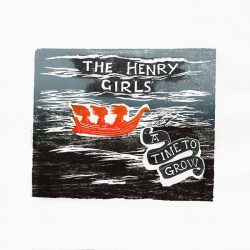 ‘A Time To Grow‘ from The Henry Girls is another opportunity for the Irish vocal trio of Karen, Lorna, and Joleen McLaughlin to demonstrate their multi-layered modern folk singing accompanied by their playing on accordion, fiddle and harp with additional instrumentation allowing songs like the title track to grow from quiet singing to a multi-layered musical crescendo. ‘Not Your Fight‘ is a powerful anti-war song which features the singing of Ríoghnach Connolly, who co-wrote the song with Karen McLaughlin. It’s a very modern take on folk with percussion and a pulsing beat – and there’s a bit of a Kate Bush feel at times – as much to the fore as the traditional instruments but retains at the core a great respect for the vocals. The piano and harp led instrumental Inghinidhe na hÉireann is five minutes of celtic folk perfection, whilst The Henry Girls take a break from seriousness with a bright and breezy love song ‘Colours In The Sky‘ designed to show off their vocal dexterity. (7/10)
‘A Time To Grow‘ from The Henry Girls is another opportunity for the Irish vocal trio of Karen, Lorna, and Joleen McLaughlin to demonstrate their multi-layered modern folk singing accompanied by their playing on accordion, fiddle and harp with additional instrumentation allowing songs like the title track to grow from quiet singing to a multi-layered musical crescendo. ‘Not Your Fight‘ is a powerful anti-war song which features the singing of Ríoghnach Connolly, who co-wrote the song with Karen McLaughlin. It’s a very modern take on folk with percussion and a pulsing beat – and there’s a bit of a Kate Bush feel at times – as much to the fore as the traditional instruments but retains at the core a great respect for the vocals. The piano and harp led instrumental Inghinidhe na hÉireann is five minutes of celtic folk perfection, whilst The Henry Girls take a break from seriousness with a bright and breezy love song ‘Colours In The Sky‘ designed to show off their vocal dexterity. (7/10)
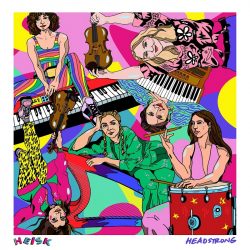 The six-piece all-female folk band HEISK have a new album, their second, called ‘Headstrong‘ which is out on The Bothy Society. The band have a core dedication to empowering women and gender minorities within traditional music and this encompasses various areas of the industry, from recording and producing to mixing, instrumental performance, marketing, business, and live shows. Laudable – but what’s the music like? Well, it’s a powerful mix of the traditional and the modern, which goes beyond the inclusion of drums to also incorporate electronic instrumentation to broaden the sound of accordion and a brace of fiddles. It’s a matter of taste of course but HEISK are at their best when the keyboards don’t intrude too greatly with little electronic insertions and “licks” which distract rather than build up what is often a powerful sound – Lauren Macdonald’s folk drumming is as excellent as any you’ll have heard recently. Their aim of updating traditional instrumental Scottish folk is largely successful, and always worth hearing. (6/10).
The six-piece all-female folk band HEISK have a new album, their second, called ‘Headstrong‘ which is out on The Bothy Society. The band have a core dedication to empowering women and gender minorities within traditional music and this encompasses various areas of the industry, from recording and producing to mixing, instrumental performance, marketing, business, and live shows. Laudable – but what’s the music like? Well, it’s a powerful mix of the traditional and the modern, which goes beyond the inclusion of drums to also incorporate electronic instrumentation to broaden the sound of accordion and a brace of fiddles. It’s a matter of taste of course but HEISK are at their best when the keyboards don’t intrude too greatly with little electronic insertions and “licks” which distract rather than build up what is often a powerful sound – Lauren Macdonald’s folk drumming is as excellent as any you’ll have heard recently. Their aim of updating traditional instrumental Scottish folk is largely successful, and always worth hearing. (6/10).
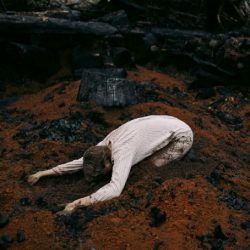 ‘Keeper of the Shepherd‘ (Ruination Record Co.) by Hannah Frances is the kind of album that restores one faith in the potential for folk music. Hannah Frances’ vision is not just artistic but powerful and brave – there are songs here that say things so directly and are also so well put that when combined with her voice, capable of so much shade and flashes of lightning, they make for an unforgettable listen. It’s an album that shows the influence of long thought – the song ‘Bronwyn‘ had apparently been tinkered with for over a year, but the majority of the album was created in a couple of weeks proceeding the booked studio time. But one listens to a song like ‘Vacant Intimacies‘ and even more so ‘Husk‘ and it is obvious that these are topics that have been long mulled over, there has been a lot of subconscious dwelling on the subject of death that all0wed for the distilling of poetic lines like “death is a thread measuring time / burning a candle dying in the light” that are then contrasted with the brutal observation on the physical frame left behind “death is a husk“. Musically the album moves from the sparest of accompaniment, coupled with ethereal layers of voices, to full augmented band sounds proudly strutting as on the rejection of sadness of ‘Haunted landscape, Echoing Caves.’ This is, obviously, the most important album of this roundup. (8/10)
‘Keeper of the Shepherd‘ (Ruination Record Co.) by Hannah Frances is the kind of album that restores one faith in the potential for folk music. Hannah Frances’ vision is not just artistic but powerful and brave – there are songs here that say things so directly and are also so well put that when combined with her voice, capable of so much shade and flashes of lightning, they make for an unforgettable listen. It’s an album that shows the influence of long thought – the song ‘Bronwyn‘ had apparently been tinkered with for over a year, but the majority of the album was created in a couple of weeks proceeding the booked studio time. But one listens to a song like ‘Vacant Intimacies‘ and even more so ‘Husk‘ and it is obvious that these are topics that have been long mulled over, there has been a lot of subconscious dwelling on the subject of death that all0wed for the distilling of poetic lines like “death is a thread measuring time / burning a candle dying in the light” that are then contrasted with the brutal observation on the physical frame left behind “death is a husk“. Musically the album moves from the sparest of accompaniment, coupled with ethereal layers of voices, to full augmented band sounds proudly strutting as on the rejection of sadness of ‘Haunted landscape, Echoing Caves.’ This is, obviously, the most important album of this roundup. (8/10)
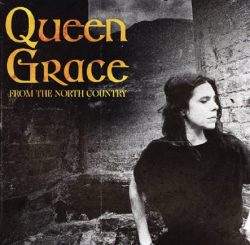 Folk singer, musician and songwriter Queen Grace was born Jennifer Concannon in Derry, and takes her recording name from the Irish pirate queen Grainne O’Malley – a figure who is now a blend of the historical and the mythical. Her debut album ‘From The North Country‘ is a collection of predominantly traditional songs with two original songs – ‘Josephine‘ an ode to her late granny and ‘Bernadette‘ about the political turmoil that lead to Bloody Sunday massacre in 1972. The songs have been taken down to their bare bones – mostly sparse guitar or unaccompanied, with a vocal that is clear and often strident in its delivery. One might think of Anne Briggs at some point, probably whilst listening to the honest delivery of ‘Blackwaterside‘, which is accompanied by a drone box. The similarly accompanied ‘He Moved Through The Fair‘ has a suitably haunted feel to it. When it comes to Queen Grace’s own songs ‘Josephine‘ is a sensitive, poetic and poignant slow ballad, whilst ‘Bernadette‘ is unapologetic in laying out the thoughts of the oppressed, and describing the events of Bloody Sunday in a dispassionate way, making the implied condemnation all the stronger. (6/10)
Folk singer, musician and songwriter Queen Grace was born Jennifer Concannon in Derry, and takes her recording name from the Irish pirate queen Grainne O’Malley – a figure who is now a blend of the historical and the mythical. Her debut album ‘From The North Country‘ is a collection of predominantly traditional songs with two original songs – ‘Josephine‘ an ode to her late granny and ‘Bernadette‘ about the political turmoil that lead to Bloody Sunday massacre in 1972. The songs have been taken down to their bare bones – mostly sparse guitar or unaccompanied, with a vocal that is clear and often strident in its delivery. One might think of Anne Briggs at some point, probably whilst listening to the honest delivery of ‘Blackwaterside‘, which is accompanied by a drone box. The similarly accompanied ‘He Moved Through The Fair‘ has a suitably haunted feel to it. When it comes to Queen Grace’s own songs ‘Josephine‘ is a sensitive, poetic and poignant slow ballad, whilst ‘Bernadette‘ is unapologetic in laying out the thoughts of the oppressed, and describing the events of Bloody Sunday in a dispassionate way, making the implied condemnation all the stronger. (6/10)


